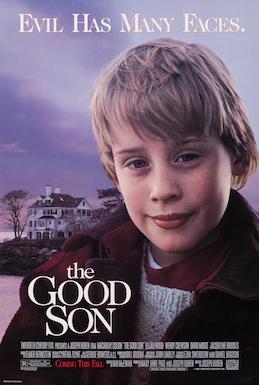
The Good Son is a 1993 American psychological thriller film directed by Joseph Ruben and distributed by 20th Century Fox. It was written by English novelist Ian McEwan. Its story follows a 12-year-old boy named Mark who, after the death of his mother, is sent to stay with his aunt and uncle while his father is away on a business trip. While there, he meets his cousin Henry, who shows signs of violent and evil behavior. It stars Macaulay Culkin, Elijah Wood, Wendy Crewson, David Morse, Daniel Hugh Kelly, and Jacqueline Brookes.

Ian Russell McEwan is a British novelist and screenwriter. In 2008, The Times featured him on its list of "The 50 greatest British writers since 1945" and The Daily Telegraph ranked him number 19 in its list of the "100 most powerful people in British culture".

The Children Act is a novel by the English writer Ian McEwan. It was published on 2 September 2014. The title is a reference to the Children Act 1989, a UK Act of Parliament. The book has been compared to Charles Dickens's Bleak House, with its similar settings, and opening lines.
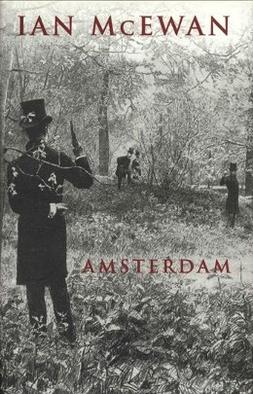
Amsterdam is a 1998 novel by British writer Ian McEwan, for which he was awarded the 1998 Booker Prize.

Saturday (2005) is a novel by Ian McEwan. It is set in Fitzrovia, central London, on Saturday, 15 February 2003, as a large demonstration is taking place against the United States' 2003 invasion of Iraq. The protagonist, Henry Perowne, a 48-year-old neurosurgeon, has planned a series of errands and pleasures, culminating in a family dinner in the evening. As he goes about his day, he ponders the meaning of the protest and the problems that inspired it; however, the day is disrupted by an encounter with a violent, troubled man.
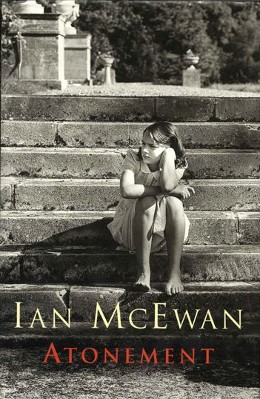
Atonement is a 2001 British metafictional novel written by Ian McEwan. Set in three time periods, 1935 England, Second World War England and France, and present-day England, it covers an upper-class girl's half-innocent mistake that ruins lives, her adulthood in the shadow of that mistake, and a reflection on the nature of writing.
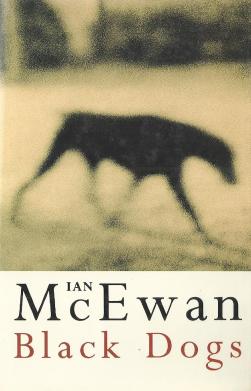
Black Dogs is a 1992 novel by the British author Ian McEwan. It concerns the aftermath of the Nazi era in Europe, and how the fall of the Berlin Wall in the late 1980s affected those who once saw Communism as a way forward for society. The main characters travel to France, where they encounter disturbing residues of Nazism still at large in the French countryside. Critical reception was polarized.

The Child in Time (1987) is a novel by Ian McEwan. The story concerns Stephen, an author of children's books, and his wife, two years after the kidnapping of their three-year-old daughter Kate.

The Innocent is a 1990 novel by British writer Ian McEwan. It received positive reviews from book critics and is considered by some to be one of his best novels.

The Comfort of Strangers is a 1981 novel by British writer Ian McEwan. It is his second novel, and is set in an unnamed city. Harold Pinter adapted it as a screenplay for a film directed by Paul Schrader in 1990, which starred Rupert Everett, Christopher Walken, Helen Mirren and Natasha Richardson. The film is set in Venice.

The Gathering is a 2007 novel by Irish writer Anne Enright. It won the 2007 Booker Prize.
Thomas Michael Maschler was a British publisher and writer. From 1960, he was influential as the head of publishing company Jonathan Cape over a period of more than three decades. Maschler was noted for instituting the Booker Prize for British, Irish and Commonwealth literature in 1969. He was involved in publishing the works of many notable authors, including Ernest Hemingway, Joseph Heller, Gabriel García Márquez, John Lennon, Ian McEwan, Bruce Chatwin and Salman Rushdie.

The Daydreamer is a 1994 children's novel by British author Ian McEwan. Illustrated by Anthony Browne. The novel was first published by Jonathan Cape. It draws its plot directly from the Rankin/Bass movie, The Daydreamer (1966) in which a young boy daydreams and enters a world of Hans Christian Andersen stories. It is considered to be McEwan's first book for children, or second if taking into account the picture book Rose Blanche (1985). Critics praised McEwan's imagination, but noted that the book had high "sweetness-and-light levels".

The Cement Garden is a 1993 British drama film written and directed by Andrew Birkin. It is based on the 1978 novel of the same name written by Ian McEwan. It was entered into the 43rd Berlin International Film Festival, where Birkin won the Silver Bear for Best Director.

Sweet Tooth is a novel by the English writer Ian McEwan, published on 21 August 2012. It deals with the experiences of its protagonist, Serena Frome, during the early 1970s. After graduating from Cambridge she is recruited by MI5, and becomes involved in a covert programme to combat communism by infiltrating the intellectual world. When she becomes romantically involved with her mark, complications ensue.
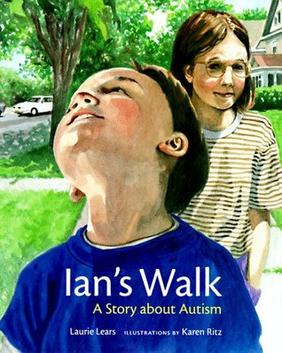
Ian's Walk: A Story About Autism is a book about autism by Laurie Lears, who also wrote Waiting for Mr. Goose, a book about Attention Deficit Hyperactivity Disorder. The story tells of a child with autism, and a walk with his sisters, and how they begin to understand him after he wanders off. Ian's Walk is regarded as a useful tool to help family members of children with autism understand associated behaviours.
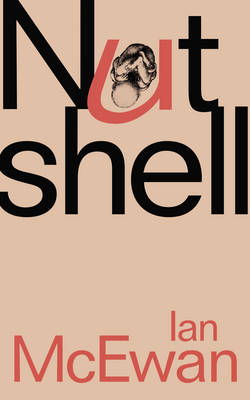
Nutshell is the 14th novel by English author and screenwriter Ian McEwan published in 2016. It alludes to William Shakespeare’s Hamlet and re-imagines the plot from the perspective of an eight-month-old unborn foetus in London in 2015.

The Children Act is a 2017 drama film directed by Richard Eyre, produced by Duncan Kenworthy, with a screenplay written by Ian McEwan, based on his 2014 novel of the same name. It stars Emma Thompson, Stanley Tucci, and Fionn Whitehead.
Julian Gloag was an English novelist and screenwriter. He was the author of eleven novels, the best known of which is his first, Our Mother’s House (1963), which was made into a film of the same name starring Dirk Bogarde.

Machines Like Me is the 15th novel by the English author Ian McEwan. The novel was published in 2019 by Jonathan Cape.


















